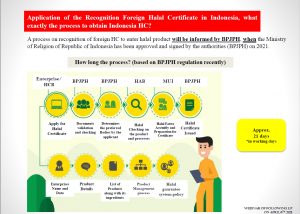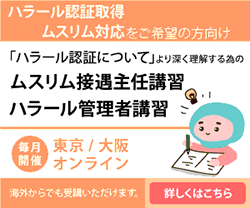NPO Japan Halal Association is a halal certification body approved by JAKIM (Malaysia), MUIS (Singapore), BPJPH (Indonesia), HAK (Turkey), GAC (Gulf countries) and MOIAT(UAE).
【Activity Report】Latest Information on Indonesian Halal Certification
Please check the background of the Indonesian government’s Halal Certification Act from here.

On March 9, 2021, Dr Sukoso, who was the director of BPJPH of Indonesia’s Ministry of Religious Affairs, was dismissed, and there were many voices of concern about the future among halal certification organizations around the world. Perhaps because of these findings, on April 6, as an opportunity to urgently explain the situation, a seminar was held for halal certification organizations around the world, and our association also participated. According to the content of the presentation at the seminar, there is no change in the laws and procedures from what has been announced so far, except that the BPJPH director has changed.
The biggest concern of the world’s halal certification bodies is the specific content of the switch from the approval of overseas certification bodies by MUI to BPJPH, a government agency, for exports to Indonesia. Most of the organizations that attended the seminar had already completed the application process for approval to BPJPH two years ago. Nevertheless, no one could hide their resentment at being left alone for two years by BPJPH. The seminar participants demanded that the newly appointed BPJPH director, Dr. Mastuki, ask him to explain whether he is willing to do something about it. There are many organizations that have not been approved by the MUI and have been unable to export to Indonesia for a long time. Dr Sukoso News Coverage Link to: https://kumparan.com/kumparanbisnis/sukoso-diberhentikan-dari-posisi-kepala-badan-penyelenggara-jaminan-produk-halal-1vK2DgmVtUq
Existence of Agreements between GtoGs
The reason for this is the “agreement” between the GtoGs. Former director Dr. Sukoso has been saying throughout his term that “we cannot move forward unless the government of your country and the government of Indonesia reach an agreement,” and as a result, apart from the special approval quota in Germany, no organization currently has been approved in this way. Certification bodies have spread to Europe, the West, and Asia, and many are non-Muslim countries. Japan is no exception Japan which ministry or agency of the government has jurisdiction over the agreement required by the Ministry of Religious Affairs, and on what basis can we say, “Approve the certification body of the Japan”? (Moreover, in a situation where restrictions on religious activities are in place in European countries, it is impossible to make an agreement with the Indonesian state for the rights of Muslims.) Many of the participants had hoped that the Indonesian government understood that the reason why the approval of overseas certification bodies had not progressed for two years was because of this “agreement”, but from the contents of the seminar it became clear that “this is not the case”. Then, since there is no choice but to raise the issue from now on, a movement for certification organizations around the world to come together and make proposals was born from among the participants through the seminar organizer KOPITU. Why persistently seek an agreement when the applicable law does not say that it cannot be approved without an agreement?
Are there any breakthroughs in non-Islamic countries where there is a problem with the “agreement”?
A sequel to the previous seminar was held on April 20, 2021. In it, a Q&A was conducted by a person belonging to the MUI, on which he said, “I am not a BPJPH person, so I can’t say for sure, but if there is a letter of recommendation from the Indonesian embassy in your country and the embassy in Indonesia in your country, it may be fine.” However, organizations that have completed their application to BPJPH should be able to say that they do not need to take any further action because these documents have already been submitted. In addition, it was stated that “Overseas approval of MUI is invalid when BPJPH’s activities become effective, but since BPJPH’s approval of overseas certification organizations has not progressed as you know, it will remain valid until then.” Malaysia also independently approves overseas certification bodies, but there is no requirement that it not approve without such a GtoG agreement. However, when approval is granted, a report goes to the embassies of each country. Isn’t that enough information for governments to grasp?
What do halal certification standards use?
In addition, BPJPH has not presented what overseas certification bodies should be based on when approving overseas. SNI99001:2016, a standard issued by Indonesia since 2016, exists, but it has not been put into practical use and has not even translated into English. Therefore, failure to present internationally accepted certification standards means that approval cannot be made. In the seminar myself, I asked the question, “What certification criteria should overseas certification organizations use?” There was no response on the spot, but in the news the day after the seminar, Dr. Mastuki, who replaced Dr Sukoso, said that the MUI halal certification standard HAS23000 will be applied as before. was reported to have responded. Rather than holding a meeting that includes many experts, academics, and industrialists from scratch and creating them for each field, continuing to use the existing halal certification standards that have already been established in the market is a much more rational choice for everyone than recreating the internal system according to the new one for the company that is using and practicing it more than anything else. However, it should not be forgotten that this content remains a “schedule” until it is documented by the Indonesian government. In addition, BPJPH explained in the seminar that the Ministry of Religious Affairs will apply the new halal certification standards as soon as it makes provisions, so there is a possibility that it will change in the future.
Dr.Mastuki News Report: https://mantrasukabumi.pikiran-rakyat.com/nasional/pr-201698137/kemenag-ratifikasi-sistem-jaminan-halal-mastuki-jadi-pedoman-pemangku-kepentingan-halal
After two seminars on the status report on the approval of Indonesian overseas certification organizations, I was able to understand that the situation has not changed much from two years ago. Although it is thought that there will be some movement in the next two years until the application of the JPH Act on Food and Beverages in 2024, we will have no choice but to wait while collecting information from time to time.





